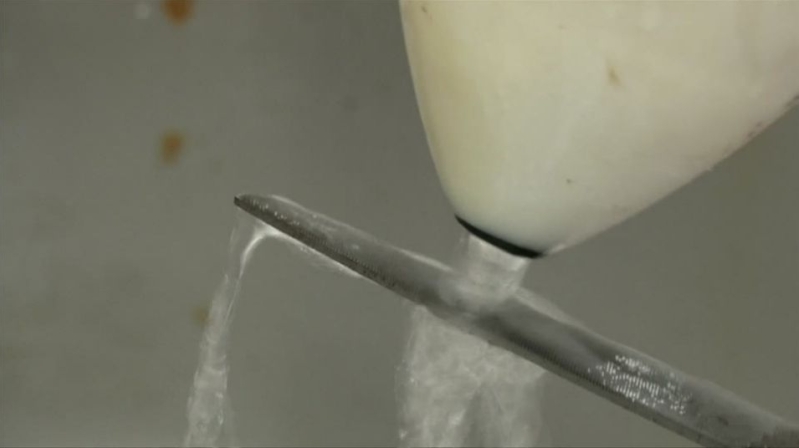
A hand-held device that infuses a gentle stream of regular cold water with ultrasound to turn it into a highly effective cleaning tool has been developed by British scientists, who say it could reduce dependence on traditional detergents and help combat anti-microbial resistance.
The device, known as Starstream, passes a gentle stream of water through a nozzle that generates ultrasound and bubbles. The oscillating effect of the sound field on the bubbles turns them into micro-scrubbers that can remove dirt and germs from most surfaces. These tiny micro-scrubbers are particularly effective at cleaning inside cracks and crevices that are difficult for conventional cleaning technologies, according to co-inventor Professor Tim Leighton.
"We wanted to build some kind of micro-scrubber that can clean without bleach and detergents, and can get into the crevices and the cracks. And so what we did, what we found is the bubble. So these gas bubbles underwater; these balls of gas, normally just sit there spherically under water. But if you hit them with a sound field you can make their surfaces ripple. And you get such high sheer and rubbing along the surfaces of these ripples that it can clean very effectively," Leighton told Reuters from his lab at the University of Southampton's Institute of Sound and Vibration Research.
The patented technology earned Leighton and co-inventor Dr Peter Birkin the Royal Society's Brian Mercer Award for Innovation in 2011. This gave them the opportunity to develop their prototype model into the current hairdryer-type design for manual cleaning. But Leighton said the technology could easily be fixed onto other devices of varying shapes and sizes. He added that Starstream's effectiveness without the need for heating or additives has the potential to transform the cleaning sector.
"One of the key factors of Starstream is that it takes any liquid that you're using and makes it several thousand times more effective. So if you're using soapy water or bleach, something like that, it'll make it more effective. But its party trick is to clean with cold water, without any additives, without heating," he said.
In laboratory-based tests, Starstream was able to effectively remove biological contamination from medical instruments and bacterial biofilms that typically cause dental disease. Leighton believes it could prove to be a valuable tool in the fight against antibiotic and anti-microbial resistance if the technology could be incorporated into the public's hand washing routine.
"If you can clean effectively, as we're doing here, then you can stop the bugs ever entering the body. And if the bugs never enter the body the person doesn't get an infection and you don't have to use these antibiotics, anti-microbial agents. And you've got a whole different pathway for tackling this anti-microbial resistance catastrophe," said Leighton.
"Despite all our efforts we haven't been able to change the behavior of people to wash their hands properly. So if we can't change the behavior, we change the water. And our aspiration would be to make that six seconds of washing in cold water without soap - using Starstream- as effective as 20 seconds of warm soapy water. It's an aspiration, we hope to realize it."
The device is in limited commercial production by company Ultrawave Ltd., but Leighton is seeking further investment to miniaturize the current design and make it a viable new tool forhealth providers and the general public.







